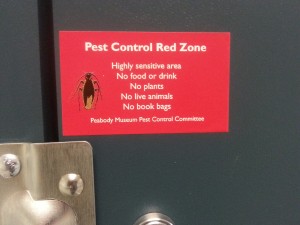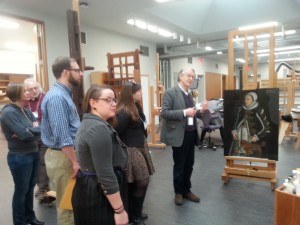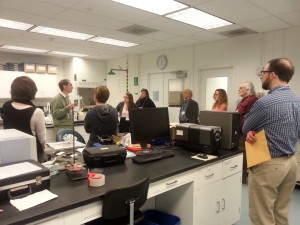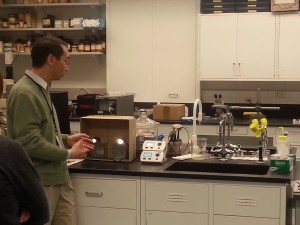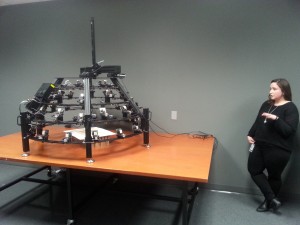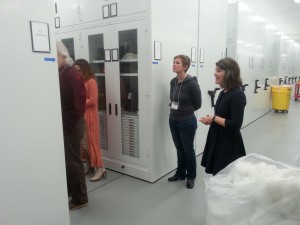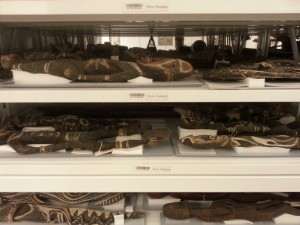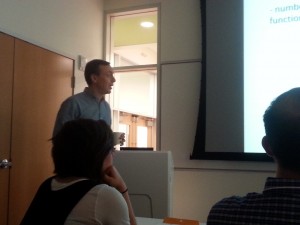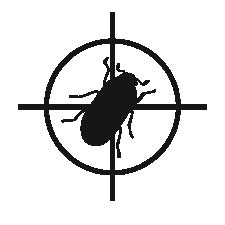IPM-Working Group’s visit to the Peabody Museum’s Collections Study Centre at Yale University West Campus.
Wednesday 16th March 2016
On the first bright-sky breezy New England day of the IPM-WG meeting, my colleague and I joined the group showing no sign of jet lag (yet) and were driven to the West Campus to visit the newly opened Centre that houses the Institute for Preservation of Cultural Heritage Labs, the Yale University Art Gallery collections and the Peabody Museum Collections.
We were treated first to a visit to the main Conservation Lab build in the site of a former pharmaceutical factory, where the safety showers for employees about to enter the adjacent packing room used to be.
Ian McClure, Chief Conservator, guided us through the Lab, a light and airy facility with plenty of space and natural light where Native American objects share the space in weirdly appropriate manner with early European oil paintings, 1960s light sculptures, and state-of-art conservation equipment, forming a very impressive, yet somehow humane and comforting space.
We then walked down the glass corridors surrounding the courtyard to meet Dr. Paul Whitmore, Director of the Aging Diagnostics Lab who introduced us to his machine capable of measuring, by spectrum analysis (if we got this right) the vulnerability of colour to fading over time when exposed to light, the microfading tester is a fantastic piece of kit that allows collections managers and conservators to asses whether an object can be displayed safely and for how long. You can learn more about Dr. Whitmore’s work by reading his papers at the JAIC journal and other academic publications.
After that we visited the phenomenal facility that is the Digitisation Centre, the very knowledgeable specialist in charge of the Centre, Chelsea Graham, showed us a variety of impressive tools such as a custom-built RTI kit and 3D imaging equipment.
We moved on to the Art Collections area where the refurbishment work has already been completed and the collections staff were busy unpacking and re-housing objects from Yale University’s Art Gallery to shiny, new “Viking” cabinets. Bianca Ruthven kindly showed us the study and storage display facilities.
The grand finale was a visit with Maureen White to the Peabody Museum’s Anthropology Division’s space where spears of all size and manner from around the world mix with the IPM challenge that represent an accumulation of hundreds of wicker and other organic material made baskets. This space also accommodates the historic scientific instruments. The rehousing in this collection space is a work in progress while the divisions awaits necessary funding.
After the guided visits to the Centre, the group attended the two scheduled presentations: the first one by Dr Nikolaus Wilke, Conservator at Thermolignum ltd. was a very informative and detailed talk describing the Thermolignum treatment system for pest eradication using heat and controlled RH. Dr. Wilke described several fascinating case studies of the use of their technology to save precious cultural heritage objects.
The second talk was delivered by Dr Lukasz Bratasz, Head of the Sustainable Conservation Lab at Yale University.
Dr Bratasz gave us a fascinating talk with a new perspective in sustainable preservation; using well presented data and insightful analysis he challenged the current mainstream guidelines in environmental parameters and made his case for a more flexible, informed and realistic approach to achieve sustainability in the fight to secure a future for cultural and scientific collections.
And so to bed…
Snug as a bug in a rug.
Sue Ryder and Armando Mendez, IPM Coordinators at the Natural History Museum, London.

